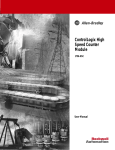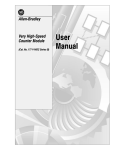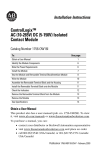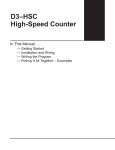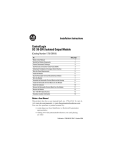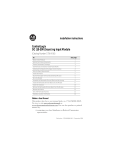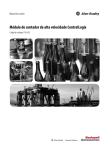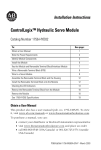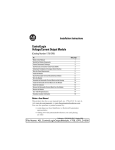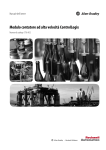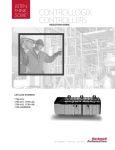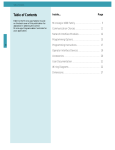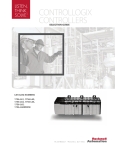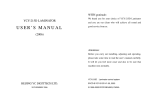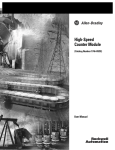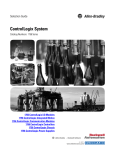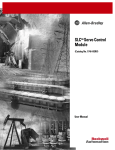Download 1756-IN018B-EN-P, ControlLogix High Speed Counter Module
Transcript
Installation Instructions
ControlLogix High Speed Counter Module
Catalog Number 1756-HSC
Use this document to install the ControlLogix™ High Speed
Counter module.
For more information on:
See page:
Identify the Module Components
7
Note the Power Requirements
7
Install the Module
8
Key the Removable Terminal Block/Interface Module
9
Wire the Removable Terminal Block
10
Ground the Module
14
Cable Considerations
15
Assemble the Removable Terminal Block and the Housing
16
Install the Removable Terminal Block onto the Module
17
Check the Indicators
18
Remove the Removable Terminal Block from the Module
19
Remove the Module
19
1756-HSC Specifications
20
Obtain a User Manual
This product has a user manual (pub. no. 1756-UM007). To view or
download it, visit www.rockwellautomation.com/literature. To
purchase a printed manual, contact your local distributor or Rockwell
Automation representative.
Publication 1756-IN018B-EN-P - August 2004
2 ControlLogix High Speed Counter Module
Important User Information
Solid state equipment has operational characteristics differing from those of
electromechanical equipment. Safety Guidelines for the Application, Installation and
Maintenance of Solid State Controls (Publication SGI-1.1 available from your local Rockwell
Automation sales office or online at http://www.ab.com/manuals/gi) describes some
important differences between solid state equipment and hard-wired electromechanical
devices. Because of this difference, and also because of the wide variety of uses for solid
state equipment, all persons responsible for applying this equipment must satisfy
themselves that each intended application of this equipment is acceptable.
In no event will Rockwell Automation, Inc. be responsible or liable for indirect or
consequential damages resulting from the use or application of this equipment.
The examples and diagrams in this manual are included solely for illustrative purposes.
Because of the many variables and requirements associated with any particular installation,
Rockwell Automation, Inc. cannot assume responsibility or liability for actual use based on
the examples and diagrams.
No patent liability is assumed by Rockwell Automation, Inc. with respect to use of
information, circuits, equipment, or software described in this manual.
Reproduction of the contents of this manual, in whole or in part, without written permission
of Rockwell Automation, Inc. is prohibited.
Throughout this manual, when necessary we use notes to make you aware of safety
considerations.
WARNING
IMPORTANT
ATTENTION
Identifies information about practices or circumstances that can cause an explosion in a
hazardous environment, which may lead to personal injury or death, property damage, or
economic loss.
Identifies information that is critical for successful application and understanding of the
product.
Identifies information about practices or circumstances that can lead to personal injury or
death, property damage, or economic loss. Attentions help you:
• identify a hazard
• avoid a hazard
• recognize the consequence
SHOCK HAZARD
Labels may be located on or inside the equipment (e.g., drive or motor) to alert people
that dangerous voltage may be present.
BURN HAZARD
Labels may be located on or inside the equipment (e.g., drive or motor) to alert people
that surfaces may be dangerous temperatures.
Publication 1756-IN018B-EN-P - August 2004
ControlLogix High Speed Counter Module 3
Environment and Enclosure
ATTENTION
This equipment is intended for use in a Pollution Degree 2 industrial
environment, in overvoltage Category II applications (as defined in IEC
publication 60664-1), at altitudes up to 2000 meters without derating.
This equipment is considered Group 1, Class A industrial equipment
according to IEC/CISPR Publication 11. Without appropriate precautions,
there may be potential difficulties ensuring electromagnetic compatibility in
other environments due to conducted as well as radiated disturbance.
This equipment is supplied as "open type" equipment. It must be mounted
within an enclosure that is suitably designed for those specific
environmental conditions that will be present and appropriately designed to
prevent personal injury resulting from accessibility to live parts. The interior
of the enclosure must be accessible only by the use of a tool. Subsequent
sections of this publication may contain additional information regarding
specific enclosure type ratings that are required to comply with certain
product safety certifications.
NOTE: See NEMA Standards publication 250 and IEC publication 60529, as
applicable, for explanations of the degrees of protection provided by
different types of enclosure. Also, see the appropriate sections in this
publication, as well as the Allen-Bradley publication 1770-4.1 ("Industrial
Automation Wiring and Grounding Guidelines"), for additional installation
requirements pertaining to this equipment.
Prevent Electrostatic Discharge
ATTENTION
This equipment is sensitive to electrostatic discharge, which can cause
internal damage and affect normal operation. Follow these guidelines when
you handle this equipment:
• Touch a grounded object to discharge potential static.
• Wear an approved grounding wriststrap.
• Do not touch connectors or pins on component boards.
• Do not touch circuit components inside the equipment.
• If available, use a static-safe workstation.
• When not in use, store the equipment in appropriate
static-safe packaging.
Publication 1756-IN018B-EN-P - August 2004
4 ControlLogix High Speed Counter Module
Removal and Insertion Under Power
WARNING
When you insert or remove the module while backplane
power is on, an electrical arc can occur. This could cause
an explosion in hazardous location installations.
Be sure that power is removed or the area is nonhazardous before
proceeding. Repeated electrical arcing causes excessive wear to
contacts on both the module and its mating connector. Worn contacts
may create electrical resistance that can affect module operation.
European Hazardous Location Approval
If you install the module in a European Zone 2 location, consider:
European Zone 2 Certification (The following applies when the product bears the
EEx Marking)
This equipment is intended for use in potentially explosive atmospheres as defined by
European Union Directive 94/9/EC.
The LCIE (Laboratoire Central des Industries Electriques) certifies that this equipment has
been found to comply with the Essential Health and Safety Requirements relating to the
design and construction of Category 3 equipment intended for use in potentially explosive
atmospheres, given in Annex II to this Directive. The examination and test results are
recorded in confidential report No. 28 682 010.
Compliance with the Essential Health and Safety Requirements has been assured by
compliance with EN 50021.
IMPORTANT
When using this product, also consider the following:
• This equipment is not resistant to sunlight or other sources of UV
radiation.
• The secondary of a current transformer shall not be
open-circuited when applied in Class I, Zone 2 environments.
• Equipment of lesser Enclosure Type Rating must be installed in
an enclosure providing at least IP54 protection when applied in
Class I, Zone 2 environments.
• This equipment shall be used within its specified ratings defined
by Allen-Bradley.
• Provision shall be made to prevent the rated voltage from being
exceeded by transient disturbances of more than 40% when
applied in Class I, Zone 2 environments.
Publication 1756-IN018B-EN-P - August 2004
ControlLogix High Speed Counter Module 5
North American Hazardous Location Approval
The following information applies
when operating this equipment in
hazardous locations:
Informations sur l’utilisation de cet
équipement en environnements
dangereux:
Products marked “CL I, DIV 2, GP A, B, C,
D” are suitable for use in Class I Division 2
Groups A, B, C, D, Hazardous Locations
and nonhazardous locations only. Each
product is supplied with markings on the
rating nameplate indicating the hazardous
location temperature code. When
combining products within a system, the
most adverse temperature code (lowest
“T” number) may be used to help
determine the overall temperature code of
the system. Combinations of equipment in
your system are subject to investigation
by the local Authority Having Jurisdiction
at the time of installation.
Les produits marqués "CL I, DIV 2, GP A, B, C, D"
ne conviennent qu’à une utilisation en
environnements de Classe I Division 2 Groupes
A, B, C, D dangereux et non dangereux. Chaque
produit est livré avec des marquages sur sa
plaque d’identification qui indiquent le code de
température pour les environnements
dangereux. Lorsque plusieurs produits sont
combinés dans un système, le code de
température le plus défavorable (code de
température le plus faible) peut être utilisé pour
déterminer le code de température global du
système. Les combinaisons d’équipements
dans le système sont sujettes à inspection par
les autorités locales qualifiées au moment de
l’installation.
Publication 1756-IN018B-EN-P - August 2004
6 ControlLogix High Speed Counter Module
The following information applies
when operating this equipment in
hazardous locations:
WARNING
EXPLOSION HAZARD
Informations sur l’utilisation de cet
équipement en environnements
dangereux:
AVERTISSEMENT
• Do not disconnect
equipment unless
power has been
removed or the area
is known to be
nonhazardous.
• Do not disconnect
connections to this
equipment unless
power has been
removed or the area
is known to be
nonhazardous.
Secure any external
connections that
mate to this
equipment by using
screws, sliding
latches, threaded
connectors, or other
means provided
with this product.
• Substitution of
components may
impair suitability for
Class I, Division 2.
• If this product
contains batteries,
they must only be
changed in an area
known to be
nonhazardous.
Publication 1756-IN018B-EN-P - August 2004
RISQUE D’EXPLOSION
• Couper le courant ou
s’assurer que
l’environnement est
classé non dangereux
avant de débrancher
l'équipement.
• Couper le courant ou
s'assurer que
l’environnement est
classé non dangereux
avant de débrancher
les connecteurs. Fixer
tous les connecteurs
externes reliés à cet
équipement à l'aide
de vis, loquets
coulissants,
connecteurs filetés ou
autres moyens fournis
avec ce produit.
• La substitution de
composants peut
rendre cet équipement
inadapté à une
utilisation en
environnement de
Classe I, Division 2.
• S’assurer que
l’environnement est
classé non dangereux
avant de changer les
piles.
ControlLogix High Speed Counter Module 7
Identify the Module Components
You received the following components with your order:
• 1756-HSC module
• Removable Terminal Block (RTB) door label
If you did not receive these components, contact your Rockwell
Automation sales office.
This module mounts in a 1756 chassis and uses a separately-ordered
RTB or a Bulletin 1492 Interface Module (IFM)(1) to connect all
field-side wiring. This module uses one of the following RTBs:
• 1756-TBCH 36 position Cage clamp RTB
• 1756-TBS6H 36 position Spring clamp RTB
Use an extended-depth cover (1756-TBE) for applications with heavy
gauge wiring or requiring additional routing space. When using an
IFM to wire your module, consult the installation instructions that
came with it to connect all wiring.
IMPORTANT
Before you install your module you should have:
• installed and grounded a 1756 chassis and power
supply.
• ordered and received an RTB and its components
for your application.
Note the Power Requirements
The module receives power from the 1756 chassis power supply and
requires 2 sources of power from the ControlLogix backplane:
• 300mA at 5.1V
• 3mA at 24V.
Add this current/power value (1.6W) to the requirements of all other
modules in the chassis to prevent overloading the power supply.
(1)
The ControlLogix system has been agency certified using only the ControlLogix RTBs (i.e. 1756-TBCH,
1756-TBNH 1756-TBSH and 1756-TBS6H). Any application that requires agency certification of the
ControlLogix system using other wiring termination methods may require application specific approval
by the certifying agency.
Publication 1756-IN018B-EN-P - August 2004
8 ControlLogix High Speed Counter Module
Install the Module
You can install or remove the module while chassis power is applied.
WARNING
When you insert or remove the module while backplane
power is on, an electrical arc can occur. This could cause
an explosion in hazardous location installations.
1. Align circuit board with top
and bottom chassis guides.
Printed
Circuit
Board
20861–M
2. Slide module into chassis until
module locking tabs ‘click’.
Locking tab
20862–M
Publication 1756-IN018B-EN-P - August 2004
ControlLogix High Speed Counter Module 9
Key the Removable Terminal Block/Interface Module
Wedge-shaped keying tabs and U-shaped keying bands came with
your RTB to prevent connecting the wrong wires to your module.
Key positions on the module that correspond to unkeyed positions
on the RTB. For example, if you key the first position on the module,
leave the first position on the RTB unkeyed.
Key the Module
1. Insert the U-shaped band as shown.
2. Push the band until it snaps in place.
U-shaped
bands
20850–M
Key the RTB/IFM
1. Insert the wedge-shaped tab with rounded edge first.
2. Push the tab until it stops.
Wedge-shaped tab
20851–M
Reposition the tabs to rekey future module applications.
Publication 1756-IN018B-EN-P - August 2004
10 ControlLogix High Speed Counter Module
Wire the Removable Terminal Block
Wire the RTB with a 1/8 inch (3.2mm) maximum flat-bladed
screwdriver before installing it onto the module. Shielded cable is
required. For most applications, we recommend you use
Belden 8761 cable.
WARNING
If you connect or disconnect wiring while the field-side
power is on, an electrical arc can occur. This could cause
an explosion in hazardous location installations. Be sure
that power is removed or the area is nonhazardous
before proceeding.
The RTB terminations can accommodate 22-14 AWM shielded wire.
Spring Clamp RTB
1. Strip 7/16 inch (11mm) maximum
length to wire your RTB.
2. Insert the screwdriver into the inner
hole of the RTB.
3. Insert the wire into the open terminal.
4. Remove the screwdriver.
20860–M
Cage Clamp RTB
1. Strip 5/16-3/8 inch (8-9.5mm)
maximum length to wire your RTB.
2. Insert the wire into the open terminal.
3. Turn the screw clockwise to close the
terminal on the wire.
20859–M
Publication 1756-IN018B-EN-P - August 2004
ControlLogix High Speed Counter Module 11
Wiring an Allen-Bradley 845 Incremental Encoder
Use Table 1 to connect the High Speed Counter module to an
Allen-Bradley 845 incremental encoder:
Table 1
Application:
A1 Connections:
B1 Connections:
Z1 Connections:
Differential
Line Driver
Output (40mA)
White - A1 (5V)
Black of white - A1
(RET)
Blue - B1 (5V)
Black of blue - B1
(RET)
Green - Z1 (5V)
Black of green - Z1
(RET)
Z0 (12-24V)
2
1
Z1 (12-24V)
Z0 (5V)
Z0 (RET)
B0 (12-24V)
B0 (5V)
4
3
6
5
8
7
10
9
Z1 (5V)
Z1 (RET)
B1 (12-24V)
B1 (5V)
B0 (RET)
A0 (12-24V)
A0 (5V)
12 11
A0 (RET)
Not used
Not used
18 17
Not used
Out 0
Out 1
24 23
COMMON 0
COMMON 0
COMMON 0
30 29
DC-0(+)
36 35
14 13
16 15
20 19
22 21
26 25
28 27
32 31
34 33
B1 (RET)
A1 (12-24V)
A1 (5V)
A1 (RET)
Not used
Not used
Green
Black
Allen-Bradley
Bulletin 845
Incremental
Encoder
Blue
Black
White
Black
Differential Line
Driver Output
Not used
Out 2
Out 3
COMMON 1
COMMON 1
COMMON 1
DC-1(+)
41601
Publication 1756-IN018B-EN-P - August 2004
12 ControlLogix High Speed Counter Module
Wiring an Allen-Bradley Bulletin 872 3-Wire DC Proximity Sensor
Use Table 2 to connect the High Speed Counter module to an
Allen-Bradley 872 3-wire DC proximity sensor:
Table 2
Application:
A0 Connections:
B0 Connections:
Z0 Connections:
PNP (Sourcing)
N.O.
Black - A0 (12-24V)
Blue, PS(-)- A0 (RET)
Jumper B0 (12-24V) to
B0 (RET)
Jumper Z0 (12-24V) to
Z0 (RET)
Allen-Bradley
Bulletin 872
3-Wire DC
Proximity
Jumpers
Sensor
12-24V dc
Black
Blue
12-24V dc
Return
Z0 (12-24V)
2
1
Z1 (12-24V)
Z0 (5V)
Z0 (RET)
B0 (12-24V)
B0 (5V)
4
3
6
5
8
7
10
9
Z1 (5V)
Z1 (RET)
B1 (12-24V)
B1 (5V)
B0 (RET)
A0 (12-24V)
A0 (5V)
12 11
A0 (RET)
Not used
Not used
18 17
Not used
Out 0
Out 1
24 23
COMMON 0
COMMON 0
COMMON 0
30 29
DC-0(+)
36 35
14 13
16 15
20 19
22 21
26 25
28 27
32 31
34 33
B1 (RET)
A1 (12-24V)
A1 (5V)
A1 (RET)
Not used
Not used
Not used
Out 2
Out 3
COMMON 1
COMMON 1
COMMON 1
DC-1(+)
41602
Publication 1756-IN018B-EN-P - August 2004
ControlLogix High Speed Counter Module 13
Wiring a Photoswitch Series 10,000 Photoelectric Sensor
Use Table 3 to connect wiring to a series 10,000 photoelectric sensor:
Table 3
Application:
A1 Connections:
B1 Connections:
Z1 Connections:
Any
Black - A1 (12-24V)
Blue - A1 (RET)
Jumper B1 (12-24V) to
B1 (RET)
White - Z1 (12-24V)
Blue - Z1 (RET)
Z0 (12-24V)
Z0 (5V)
Z0 (RET)
B0 (12-24V)
B0 (5V)
2
1
4
3
6
5
8
7
10
9
B0 (RET)
A0 (12-24V)
A0 (5V)
12 11
A0 (RET)
Not used
Not used
18 17
Not used
Out 0
Out 1
24 23
COMMON 0
COMMON 0
COMMON 0
30 29
DC-0(+)
36 35
14 13
16 15
20 19
22 21
26 25
28 27
32 31
34 33
Z1 (12-24V)
Z1 (5V)
Z1 (RET)
B1 (12-24V)
B1 (5V)
B1 (RET)
A1 (12-24V)
A1 (5V)
A1 (RET)
Not used
Not used
Photoswitch
Series
10,000
Whit
Blue
10-30V dc
Not used
Black
Jumper
12-24V
Not used
Out 2
Out 3
COMMON 1
COMMON 1
COMMON 1
DC-1(+)
41603
Publication 1756-IN018B-EN-P - August 2004
14 ControlLogix High Speed Counter Module
Ground the Module
When grounding the module, follow these guidelines:
• Ground the cable at the chassis mounting tab, as
described below.
• The shield on your cable should extend the length of the cable
to the point of termination, exposing just enough cable to
adequately terminate the inner conductors at the chassis
and RTB.
• Use heat shrink or another suitable insulation where the wire
exists the cable jacket (shown below).
Connect grounded end of the cable
1. Ground the drain wire at the chassis mounting tab.
A. Remove a length B. Pull the foil shield C. Twist the foil shield
and drain wire
and bare drain
of cable jacket
together to form a
wire from the
from the
single strand.
insulated wire.
connecting cable.
D. Attach a ground
lug and apply heat
shrink tubing to
the exit area.
20104-M
E. Connect the drain
wire to a chassis
mounting tab.
20918-M
Use any chassis
mounting tab that is
designated as a
functional earth
ground terminal.
This symbol
appears near
the tab.
4M or 5M (#10 or
#12) star washer
Chassis mounting tab
Drain wire with ground lug
4M or 5M (#10 or
#12) phillips screw
and star washer
(or SEM screw)
2. Connect the insulated wires to the RTB (see page 10).
Publication 1756-IN018B-EN-P - August 2004
ControlLogix High Speed Counter Module 15
Connect ungrounded end of the cable
1. Cut the foil shield and drain wire back to the cable casing. To
insulate them from electrical contact, tape exposed shield and
drain wire with electrical tape.
2. Connect the insulated wires to the field-side device.
Cable Considerations
We recommend using Belden 8761 for your High Speed Counter
module, for most applications. For demanding applications (e.g.,
applications with frequencies of +100KHz and cable length of
+100 ft), we recommend using Belden 9182 cable. When wiring your
application, consider cable length, impedance, capacitance and
frquency and totem-pole devices.
Cable Length
Long cables can result in changes in duty cycle, rise and fall times,
and phase relationships. For applications using a differential line
driver, we recommend 250ft or less of cable. For applications using
an open collector, or other single-ended driver, we recommend 250 ft
or less of any of the following 5V line drivers:
• DM8830
• DM88C30
• 75ALS192
Cable Impedance
We recommend 150Ω Belden 9182 cable for use with encoder and
module input circuits.
IMPORTANT
Termination of one, or both ends, of the cable with a
fixed resistor whose value is equal to the cable
impedance will not necessarily improve ‘reception’ at
the end of the cable. It will increase the dc load seen by
the cable driver, though.
Publication 1756-IN018B-EN-P - August 2004
16 ControlLogix High Speed Counter Module
Cable Capacitance
High capacitance cable rounds off incoming square wave edges and
uses driver current to charge and discharge. Also, remember that
increasing cable length causes a linear increase in capacitance.
Cable Frequency
The maximum encoder input of 250KHz is designed to work with
Allen-Bradley Bulletin 845H or similar incremental encoders with a
quadrature specification of 90o (+22o) and a duty cycle specification
of 50%(+10%). Additional phase or duty cycle changes caused by the
cable will reduce the specified 250KHz specification.
Totem-pole Output Devices
Standard TTL totem-pole output devices, usually rated to source
400µA at 2.4V in the high logic state, will not turn on the High Speed
Counter module. We recommend using a high current 5V differential
line driver when choosing an encoder.
Assemble the Removable Terminal Block and the Housing
1. Align the groove at the bottom of each side of the housing with the side edges of the RT
Groove
Side edge of RTB
Groove
Strain relief area
Side edge of RTB
20858–M
Publication 1756-IN018B-EN-P - August 2004
ControlLogix High Speed Counter Module 17
Install the Removable Terminal Block onto the Module
WARNING
When you connect or disconnect the Removable
Terminal Block (RTB) with field side power applied, an
electrical arc can occur. This could cause an explosion in
hazardous location installations.
Before proceeding with RTB installation, make certain:
•
•
•
•
•
power is removed or the area is nonhazardous.
field-side wiring of the RTB has been completed.
the RTB housing is snapped in place on the RTB.
the RTB housing is closed.
the locking tab at the top of the module is unlocked.
1. Align the side and top, bottom guides.
Module guide
RTB guides
20853–M
2. Press quickly and evenly to seat the RTB until the latches snap into place.
Locking tab
3. Slide the locking tab down.
20854–M
Publication 1756-IN018B-EN-P - August 2004
18 ControlLogix High Speed Counter Module
Check the Indicators
The 1756-HSC module uses the following status indicators.
COUNTER
A B Z
0 0 0
O O
0 1
A B Z
1 1 1 O
K
O O
2 3
DC I/O
42454
LED
indicator
This
display:
Means:
Take this action:
Input
(A, B, Z)
Off
Input turned off
Input not currently used
Wire disconnected
If you need to use the input,
check wiring connections
On/Yellow
Input turned on
None
Off
Output turned off
Output not currently used
If you need to use the
output, check input wiring
connections and your ladder
application.
On/Yellow
Output turned on
None
Output
(0, 1, 2, 3)
This completes installation of the module. Use the information below
to remove the module.
Publication 1756-IN018B-EN-P - August 2004
ControlLogix High Speed Counter Module 19
Remove the Removable Terminal Block from the Module
If you need to remove the module, you must remove the RTB first.
WARNING
When you insert or remove the module while backplane
power is on, an electrical arc can occur. This could cause
an explosion in hazardous location installations. Be sure
that power is removed or the area is nonhazardous
before proceeding.
Before removing the module, you must remove the RTB.
1. Unlock the locking tab at
the top of the module.
2. Open the RTB door and pull
the RTB off the module.
42517
20855–M
Remove the Module
1. Push in top and bottom locking tabs.
20856–M
2. Pull module out of the chassis.
20857–M
Publication 1756-IN018B-EN-P - August 2004
20 ControlLogix High Speed Counter Module
1756-HSC Specifications
Module Location
1756 ControlLogix Chassis
Backplane Current
300mA @ 5.1V dc , 3mA @ 24V dc
Backplane Power
1.9W
Maximum Power Dissipation
(Module)
5.6 W @ 60°C
Thermal Dissipation
19.1 BTU/hr
Module Input Current
Input - 2V – 16Ω
Number of Counters
2
Inputs per Counter
3 ( A, B, Z for Gate/Reset)
Maximum Input Frequency
1 MHz in counter modes (A input)
500 KHz in rate measurement mode (A input)
250 KHz in encoder mode (A/B inputs, X1 or X4)
50Hz with debounce filter enabled
Count Range
0 - 16,777, 214
Input Voltage Range
5V Inputs
12-24V Inputs
4.5-5.5V dc
10-26.4V dc
Input Current
Nominal
Minimum
15mA
4mA
Number of Outputs
4 ( 2 outputs/common)
Output Voltage Range
4.5-5.5V dc
10-31.2V dc
Output Current Rating (per point)
20mA @ 4.5-5.5V dc
1.0A @ 10-31.2V dc
Surge Current/Point
2A for 10 ms every 1s @ 60°C
Output Control
Any number of outputs is assignable to each counter
channel. Each output can have 2 “turn-on” and
“turn-off” preset values.
Publication 1756-IN018B-EN-P - August 2004
ControlLogix High Speed Counter Module 21
Minimum Load Current
3mA/point (5V operation)
40mA/point (12-24V operation)
Maximum On-state Voltage
Drop/Output
0.55V
Maximum Off-State Leakage
Current/Output
300µA/point
Output Delay Time
Off to On
On to Off
20µs typical (50µs maximum)
60µs typical (300µs maximum)
Current Limit
<4A
Output Short Circuit Protection
Electronic – Remove load and toggle output On-Off
to restore
Reverse Polarity Protection
Yes (If wired incorrectly, module outputs may be
permanently disabled)
Isolation
Group to Group
User to System
125 V continuous between groups
(100% tested at 1700V dc for 1s)
125V continuous
(100% tested at 1700V dc for 1s)
Module Keying (Backplane)
Software configurable
RTB Screw Torque (Cage clamp)
4.4 inch-pounds (0.4Nm)
RTB Keying
User defined mechanical keying
RTB and Housing
36 Position RTB (1756-TBCH or TBS6H)
Conductors
Wire Size
Wire Type
#22 to #14 AWG (0.324 to 2.08 sq. mm) stranded(2)
3/64 inch (1.2mm) insulation maximum
Copper
Category
1(3)
Screwdriver Width for RTB
1/8 inch (3.2mm) maximum
Publication 1756-IN018B-EN-P - August 2004
22 ControlLogix High Speed Counter Module
Environmental Conditions
Operational Temperature
IEC 60068-2-1 (Test Ad, Operating Cold),
IEC 60068-2-2 (Test Bd, Operating Dry Heat),
IEC 60068-2-14 (Test Nb, Operating Thermal Shock):
0 to 60°C (32 to 140°F)
Storage Temperature
IEC 60068-2-1 (Test Ab, Un-packaged Non-operating
Cold),
IEC 60068-2-2 (Test Bb, Un-packaged Non-operating
Dry Heat),
IEC 60068-2-14 (Test Na, Un-packaged
Non-operating Thermal Shock):
-40 to 85°C (-40 to 185°F)
Relative Humidity
IEC 60068-2-30 (Test Db, Un-packaged Non-operating
Damp Heat):
5 to 95% non-condensing
Vibration
IEC 60068-2-6 (Test Fc, Operating):
5g @ 10-500Hz
Operating Shock
IEC 60068-2-27 (Test Ea, Unpackaged Shock):
30g
Non-operating Shock
IEC 60068-2-27 (Test Ea, Unpackaged Shock):
50g
Emissions
CISPR 11:
Group 1, Class A
ESD Immunity
IEC 61000-4-2:
6kV contact discharges
8kV air discharges
Radiated RF Immunity
IEC 61000-4-3:
10V/m with 1kHz sine-wave 80%AM from 30MHz to
1000MHz
10V/m with 200Hz 50% Pulse 100%AM at 900Mhz
EFT/B Immunity
IEC 61000-4-4:
±4kV at 2.5kHz on power ports
±4kV at 2.5kHz on signal ports
Publication 1756-IN018B-EN-P - August 2004
ControlLogix High Speed Counter Module 23
Surge Transient Immunity
IEC 61000-4-5:
±1kV line-line(DM) and ±2kV line-earth(CM) on
power ports
±1kV line-line(DM) and ±2kV line-earth(CM) on signal
ports
±2kV line-earth(CM) on shielded ports
Conducted RF Immunity
IEC 61000-4-6:
10Vrms with 1kHz sine-wave 80%AM from 150kHz to
80MHz
Enclosure Type Rating
None (open-style)
(1)
Certifications
(when product is marked)
UL
CSA
CSA
CE
C-Tick
EEx
UL Listed Industrial Control Equipment
CSA Certified Process Control Equipment
CSA Certified Process Control Equipment
for Class I, Division 2 Group A,B,C,D
Hazardous Locations
European Union 89/336/EEC EMC
Directive, compliant with:
EN 50082-2; Industrial Immunity
EN 61326; Meas./Control/Lab.,
Industrial Requirements
EN 61000-6-2; Industrial Immunity
EN 61000-6-4; Industrial Emissions
Australian Radiocommunications Act,
compliant with:
AS/NZS CISPR 11; Industrial Emissions
European Union 94/9/EC ATEX Directive,
compliant with:
EN 50021; Potentially Explosive
Atmospheres, Protection "n" (Zone 2)
(1)
See the Product Certification link at www.ab.com for Declarations of Conformity, Certificates, and
other certification details.
(2)
Maximum wire size will require extended housing - 1756-TBE.
(3)
Use this Conductor Category information for planning conductor routing. Refer to Publication
1770-4.1, "Industrial Automation Wiring and Grounding Guidelines".
Publication 1756-IN018B-EN-P - August 2004
Rockwell Automation Support
Rockwell Automation provides technical information on the web to assist you
in using its products. At http://support.rockwellautomation.com, you can find
technical manuals, a knowledge base of FAQs, technical and application
notes, sample code and links to software service packs, and a MySupport
feature that you can customize to make the best use of these tools.
For an additional level of technical phone support for installation,
configuration and troubleshooting, we offer TechConnect Support programs.
For more information, contact your local distributor or Rockwell Automation
representative, or visit http://support.rockwellautomation.com.
Installation Assistance
If you experience a problem with a hardware module within the first 24 hours
of installation, please review the information that's contained in this manual.
You can also contact a special Customer Support number for initial help in
getting your module up and running:
United States
1.440.646.3223 Monday – Friday, 8am – 5pm EST
Outside United States
Please contact your local Rockwell Automation representative for any
technical support issues.
New Product Satisfaction Return
Rockwell tests all of its products to ensure that they are fully operational when
shipped from the manufacturing facility. However, if your product is not
functioning and needs to be returned:
United States
Contact your distributor. You must provide a Customer Support case number
(see phone number above to obtain one) to your distributor in order to
complete the return process.
Outside United States
Please contact your local Rockwell Automation representative for return
procedure.
Publication 1756-IN018B-EN-P - August 2004
Supersedes Publication 1756-IN018A-EN-P - March 2001
PN 957928-27
Copyright © 2004 Rockwell Automation, Inc. All rights reserved. Printed in the U.S.A.
























